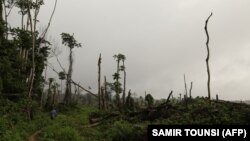The United States is partnering with African nations to formulate and implement a strategy aimed at mitigating climate change, helping Africans adapt to its effects, and supporting a just energy transition. “African nations have contributed relatively little to this crisis but are disproportionally harmed by it,” said Secretary of State Antony Blinken.
To achieve our shared priorities, we must work together as equal partners, said Secretary Blinken. “First, we are partnering to conserve ecosystems. Africa is home to some of the world’s most precious ecosystems, which are critical for combating climate change.”
“To support the sustainable management of the Congo Basin rainforest, we’ve invested over $600 million in the Central Africa Regional Program for the Environment, which brings together the U.S. Government and African and U.S. NGOs,” he said.
To protect other vital ecosystems, we are building coalitions between Africa’s governments, the private sector, and civil society.
Second, through the President’s Emergency Plan for Adaptation and Resilience, we are working with national governments to help more than half a billion people in developing countries manage the impacts of climate change. At COP 27 in Sharm el-Sheikh, the United States announced $28.6 million to help fill weather, climate, and water observation gaps and co-develop early warning systems in Africa; $24 million to enhance regional risk insurance pools; $25 million to launch the Africa Adaptation Initiative’s Food Security Accelerator; and $10 million to support the launch of the Cairo Center for Learning and Excellence on Adaptation and Resilience to build capacity across the continent.
“Third, we’re partnering to advance a just transition to a clean energy economy,” said Secretary Blinken. “Africa will be at the center of the clean energy transition. Its renewable energy potential is second to none. It’s home to roughly a third of all critical minerals, essential to the technology that will power the clean energy economy, like batteries for renewable energy storage and wind turbines.”
To do this, the United States sponsors programs like the Power Africa Presidential Initiative, which has helped 165 million more people in Sub-Saharan Africa to access cleaner, reliable energy. The United States is investing another 290 million dollars in Power Africa.
“All of these efforts recognize that combating the climate crisis, like so many other challenges we face, was actually championed by Africans in the first place,” said Secretary Blinken. “In Africa, we see not only the stakes of this crisis, but also the solutions.”






